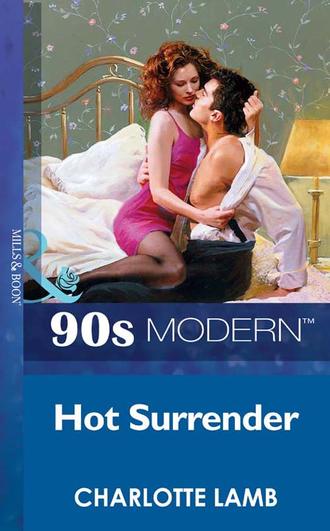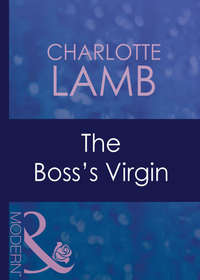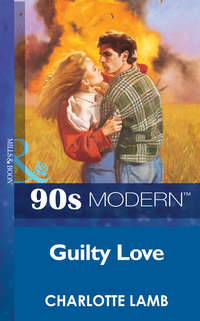
Полная версия
Hot Surrender
Usually when she woke up it was still dark, even in summer. Film-making began with first light and only ended when the light went. She should have been up hours ago. Sharply turning her head to look at her alarm clock, she saw it was eight o’clock.
Eight o’clock?
Horrified, she sat up—why hadn’t the alarm gone off? Surely she couldn’t have slept through it?
At the same instant her memory rushed in with images of what had happened last night, and she stiffened, her eyes flashing round the bedroom. How had she got here? For a second or two her head swam with bewilderment.
The last thing she remembered was sitting with her head on her arms, while behind her Connel Hillier talked about his brother.
She must have drifted off to sleep. Yes, but how had she got up here, into bed? Panic flooded her. Her heart beat like a steam hammer in her chest, behind her ribs. She couldn’t breathe. What had happened last night? After she fell asleep? She couldn’t remember coming upstairs; she hadn’t set her alarm. How had she got here?
She had been fully dressed, wearing that old grey sweater and her shabbiest pair of jeans—she lifted the sheet and looked down at herself, turned scarlet. She wasn’t wearing them now! All she had on was her bra and panties.
‘Oh, my God,’ she groaned aloud. He must have carried her up here, stripped her...and then...? What had happened then?
Heat burned in her face. She didn’t want to think about it. She flung back the covers and jumped out of bed, grabbed a dressing gown from her wardrobe and put it on, then crept out on to the landing, listening for sounds.
Where was he?
The house was silent; the familiar sounds were all she could hear: a Victorian clock she had bought in a junk shop ticking sonorously from her sitting room, the hum of electricity from the kitchen, and from the trees in the garden a whispering of autumn leaves, the sound of birds.
On tiptoe she went from room to room upstairs, but there was no sign of him, so she stole downstairs and began to search there, but he was nowhere in the house, and nothing seemed to be missing. She didn’t have anything very valuable in the way of antiques, of course, but her electrical equipment was all still in place—TV, video player, stereo equipment—none of it had gone.
The kitchen was spotless, the dishes he had used washed up and put away, the sink cleaned, the hob as clean as if he had never been there, and there was no sign of his clothes in the tumble dryer. He must have waited for them to dry properly, then put them on and gone.
Her car! she thought, hurrying to open the front door, but it still stood there, on the drive, where she had left it; the rain was drying on the glossy surface now, the chrome flashing in the sunlight.
She shut the front door again. He had gone, leaving no trace. She might almost have imagined the whole incident. She wished she could believe she had.
But the phone was still unplugged; she hadn’t invented him pulling it out of the wall! She bent to plug it back in, then went back upstairs and showered, got dressed, like a zombie, moving automatically in her usual routine before leaving for work, but with brow furrowed, eyes blank in deep thought.
He had carried her upstairs, taken her clothes off and put her into her bed. Was that all he had done?
Had he got in bed with her? Had he...?
No! she told herself fiercely. She would have woken up if he had tried to have sex with her. Of course she would!
She hadn’t woken up while he was carrying her upstairs, or taking off her jeans, though. It couldn’t have been easy to get her jeans off without disturbing her, could it?
Maybe he had woken her up, though? Maybe she had stirred, becoming aware, woken up? But... if she had, she would remember, wouldn’t she? And she didn’t recall a thing after she’d put her head on her arms and drifted off to sleep.
She didn’t want to think about it. Angrily she ran downstairs, made herself black coffee but didn’t eat anything. Her appetite had gone. In fact, she felt sick.
She stood by the window, drinking her hot coffee, staring out at the bright, autumn morning, making herself observe what she saw instead of thinking about last night. In her job that was vital, the act of observing, seeing, far more important than words, and it helped her to forget herself.
After all that torrential rain the sky was blue and cloudless; the sun shone as brilliantly as if it was summer again. Leaves blew across the damp grass of her lawns; orange, bronze, gold, dark brown, they heaped up behind her garden wall. She must get out there and rake them up on her next day off. There were few flowers around now: a bush of dark blood-red fuchsia, the bells drooping, still heavy with yesterday’s rain, pale blue and pink lace-capped hydrangeas, a few white winter roses. But autumn had other pleasures; she stared at spiders’ webs glittering on bushes, delicate, complex patterns filmed with dew, as bright as diamonds in this sunlight, and fluttering in the wind like ancient flags.
But however hard she tried to think about other things she kept coming back to last night. How was she going to work today? How could she concentrate when somewhere at the edge of her mind was a vague memory, like a dream, half remembered. Warm hands touching her, softly caressing...
Groaning again, she shook her head. No, she didn’t remember that. She didn’t remember anything.
Her nerves jumped as the telephone began to ring. She slowly went to pick it up, her fingers slippery with perspiration.
‘Hello?’ She couldn’t quite make her voice steady. It wouldn’t be him—why should he ring her? Yet somehow she didn’t feel she had seen the last of him. He had left her off balance, nervous, with this worrying feeling that something had happened last night that wasn’t going to be easy to forget.
‘Zoe?’ The voice at the other end was uncertain, but very familiar, and she relaxed. ‘Is that you? Are you okay?’ It was her production runner, Barbara, a lively, eager, hard-working girl in her early twenties, who was normally full of bounce, but this morning sounded faintly anxious.
Pulling herself together, Zoe huskily reassured her. ‘Of course I am—what do you mean?’
‘You sounded breathless. Did I wake you up? Had you forgotten you called an early start, for five-thirty? Or did you oversleep?’
‘Yes, sorry, my alarm didn’t go off.’ They must all be cursing her, getting them there so early and then not turning up, and she couldn’t blame them; she would feel just the same in their shoes. ‘I’m just leaving, Barbara. I should be there in half an hour. Has Will started work? Is he setting up the cameras?’
‘Yes, he’s more or less ready, I think. He just broke to have some breakfast, and there’s a crowd of extras milling around eating sausage baps.’
‘Okay. I’ll get there as soon as I can.’
Zoe hung up, locked the cottage, got behind the wheel of her car and started the engine, pushing away the memory of what had—or hadn’t—happened last night.
She would think about that some other time. She couldn’t afford to be distracted by anything, or anyone, until this film was finished.
With any luck she would never set eyes on Connel Hillier again, anyway.
CHAPTER THREE
THE following Saturday Zoe wasn’t working—she often worked seven days a week, but officially it was six days. The film unions wouldn’t permit their members to work all week without a day off, not that that applied to a director, who could work whenever she chose, planning, rewriting, working out shots in a model of the set. Without her film crew, of course. They usually crashed out for hours, so sleep-starved after working long hours every other day that they rarely surfaced again until the evening when they headed for bright lights and some fun.
Zoe got up at eleven that Saturday, had a real breakfast for once, a bowl of fresh fruit and a boiled egg with toast, listening to local radio. Someone had rung her a couple of times without leaving a message on her answer-machine. Who had that been? she wondered, and hoped it hadn’t been Larry again. He was becoming a nuisance.
Her sister’s voice came on next. ‘Aren’t you ever at home? Look, tonight, six o’clock, don’t forget, or else! Oh, and bring a bottle, preferably red wine. It goes so well with steak.’
After tidying the kitchen and making her bed, Zoe went to the hairdresser, then ate lunch in the local pub, which did a wonderful mushroom risotto, played a concentrated game of dominoes with friends. At two-thirty she drove to the local supermarket and did her weekend shopping, then went home to put it all away before doing an hour’s housework. She enjoyed Saturday; it was peaceful and restful not to have to tell anyone else what to do, and to be able to sleep as late as she liked and be as lazy as she chose.
At four she stripped down to her bra and panties and went back to bed for an hour, setting her alarm to make sure she woke up in time to go to her sister’s barbecue.
The alarm going off was a shock to her system. She was dragged out of a dream, her nerves jangling, but that was normal to her. Eyes still shut, she groped her way to the clock, to push down the button, then swung her legs out of bed to make sure she didn’t fall asleep again.
Yawning and flushed, she stretched, stood up, opened her eyes and made her way to the bathroom to shower before getting dressed. The lukewarm water was refreshing, cooling down her skin, waking her properly. Standing by the window later, she saw that the wind and rain had passed. The weather had warmed up, the late-evening sun was shining, the sky was blue and clear, not a cloud in sight. It could be summer instead of autumn. A perfect evening for a barbecue.
She put on her favourite casual outfit, a jade-green-trouser suit. Under the jacket she wore a bronze silk sleeveless tunic so fine it could be drawn through the exactly matching bronze Celtic bracelet she wore on one arm. She had bought this replica at the British Museum shop; it was inscribed with runic writing.
It was nearly six-thirty by the time she got to her sister’s house and the barbecue was already crowded and noisy, mostly with children, Zoe was sorry to see. Her nephews rushed at her, pink and excited.
‘A balloon landed on the barbie and blew up!’
‘Dad went crazy!’
‘You should have heard him shouting!’
They both giggled, looking at each other. ‘It really made him jump!’
Zoe eyed them shrewdly. ‘It wouldn’t have been you two who lobbed the balloon on to the barbie, by any chance?’
‘Us?’ The eldest, seven-year-old Felix, said innocently, his eyes reminding her of his father. You could see already what Felix would look like when he was Mark’s age—he was going to be tall, dark, bony, very attractive.
‘It just blew down from a tree, honestly!’ six-year-old Charlie said, but a dimple in his cheek and a chuckle in his voice gave him away. He wasn’t yet quite out of babyhood, face and body still soft and downy, but he tumbled in his big brother’s wake everywhere, falling over, bruising himself, but determined to do everything Felix did. He wasn’t as much like his father. Zoe saw her sister in him, Sancha’s warmth, her tenderness, her sensitivity. No need to worry about Felix; he was as tough as a tree and full of confidence. But Charlie was different. Zoe knew Sancha worried about him.
‘Oh, there you are! I said six, not half past!’ Sancha gave her a quick hug, then looked her up and down, making a face. ‘You look as if you’re dressed for a nightclub. I suppose you bought that outfit in Paris when you went there last month?’
‘No, London, and it’s a year old! Sorry I’m late. I had so much to do. My one day off! I’ve been rushing about, shopping, doing housework. Here, my contribution to the bar!’ Zoe handed her sister the two bottles of red Chianti she was carrying.
‘Chianti! Lovely. Thanks. It will remind us of our wonderful Tuscan holiday—it was quite a wrench to come back. We loved it, didn’t we, boys?’
‘Yeah,’ Charlie said blissfully. ‘I drank lots of wine.’
‘You had a sip from your father’s glass once or twice!’ Sancha rephrased, smiling indulgently.
‘It was really cool!’ Felix said nostalgically. ‘We had a pool and swam every day. I taught Flora to swim.’
‘To float, anyway.’ His mother nodded. ‘She looked so sweet, paddling around in a plastic duck boat. Did I show you the photos, Zoe? I must get them out later.’
‘I can’t wait. Talking of monsters, where is she?’ Zoe looked around warily.
At once alarmed, Sancha looked around too. ‘Boys, where is she? I told you to look after her.’
‘Under that bush,’ Charlie told her, pointing a stubby pink finger at a blue hydrangea covered in great, lacy heads of sky-blue flowers. Flora, in pink dungarees and a pink sweater, her red hair tousled and stuck with several of the bright blue flower-heads, lay on her back under the branches, fast asleep, her mouth open, snoring loudly, a piece of doughnut clutched in one hand.
Sancha’s face glowed with mother love. ‘Doesn’t she look adorable?’
‘That’s not a word I’d ever apply to Flora, but that’s how I like her best, fast asleep and not doing anything,’ Zoe admitted. ‘It’s when she wakes up and starts getting about that I get nervous.’
The boys grinned. ‘Me, too,’ Charlie agreed.
‘She always wants to play with us,’ Felix complained. ‘And she’s too little and keeps falling over, and screaming, then we get blamed.’
‘You’re the oldest; you should take care of your baby sister,’ their mother scolded, and the boys grimaced at their aunt.
From the barbecue site Mark waved, calling, ‘Come and help, boys!’
‘We have to be waiters,’ Felix gloomily said. ‘And give out the food to people. It’s boring.’
‘Off you go,’ their mother insisted, however, so they trudged off reluctantly, as if there was lead in their shoes.
‘So what’s the great news you mentioned?’ Zoe asked her sister, and Sancha beamed.
‘I’m going to start my own firm!’
Amazed, Zoe asked, ‘Doing what?’
‘Photography, stupid! I’ve taken a lease on a shop in Abbot Street, just behind the High Street. It will take a couple of months to make some essential changes to the shop fittings, so I’ll open up around Christmas, spacialising in children and make-overs.’
‘Make-overs?’
‘Oh, you know—a woman comes in wanting a photo that makes her look better than she usually does! Martha is going to do the hair and make-up; we’re going into partnership. When she’s transformed the client I take a series of soft-focus shots.’
‘You should make millions,’ Zoe said, laughing.
‘You may laugh. You don’t need a helping hand—some women do! I did myself a year ago, remember.’
‘Well, you don’t need one now; you look terrific!’ Zoe said, smiling at her. ‘And I’ll keep my fingers crossed your new venture is a huge success. Is Mark okay about it?’
‘Very supportive—in fact, he put up half the money. He insisted. He thinks I’ve had a brilliant idea and he wanted to back me. Mark’s very shrewd, too, so it was very encouraging to know he approved of my concept.’
‘Amazing,’ Zoe murmured. ‘The man surprises me sometimes. But then all men give you surprises, not all of them pleasant.’
‘Talking about men, where’s yours?’ asked Sancha.
‘Who?’ Zoe stared at her in bafflement.
‘Whoever you’re seeing at the moment—I told you to bring a guy.’
Zoe shrugged. ‘I’m not seeing anyone. I’m too busy for a social life.’
‘What happened to...was it... Harry? No, Larry? He was the last one I met.’
‘He turned out to be a bit weird, so I broke it off.’
Sighing heavily, Sancha told her, ‘Zoe, if you keep dumping men like this you’ll end up a lonely spinster!’
‘I’ve heard that a hundred times! And I’m not lonely, nor do I spin. Or sew, come to that. Women don’t have to marry these days to enjoy life. I’ve got a career that’s more important to me than any man I ever meet. I earn a lot of money and have a lot of fun, and above all I love my work. I enjoy men’s company when I’m in the mood but I don’t need a man to make my life complete.’
Конец ознакомительного фрагмента.
Текст предоставлен ООО «ЛитРес».
Прочитайте эту книгу целиком, купив полную легальную версию на ЛитРес.
Безопасно оплатить книгу можно банковской картой Visa, MasterCard, Maestro, со счета мобильного телефона, с платежного терминала, в салоне МТС или Связной, через PayPal, WebMoney, Яндекс.Деньги, QIWI Кошелек, бонусными картами или другим удобным Вам способом.








